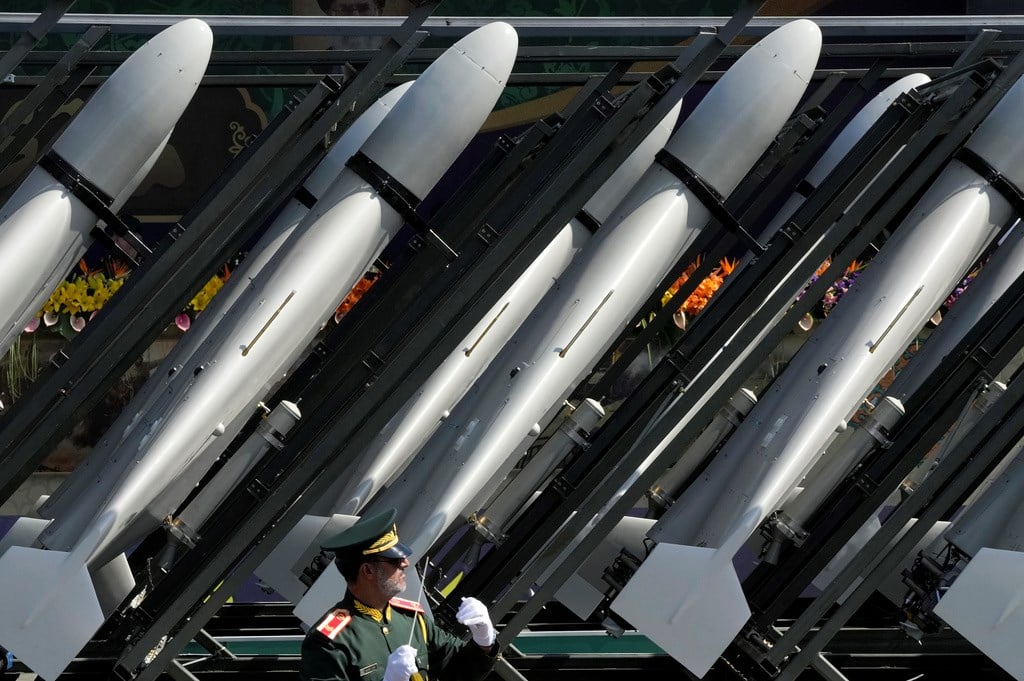Ukraine shows readiness to strike Iran, Syria over Shahed-136 drones
In a 47-page document, Ukraine has asked its G7 allies to provide it with the necessary means to attack alleged production sites of Shahed-131 and 136 attack drones in Iran, Syria, and Russia, speaking to its aggressive nature.
-

Iranian suicide drones loaded onto their launching pads make their way through a military parade organized in Tehran, Iran, on September 22, 2023 (AP)
Ukraine is ready to attack sites in Syria and Iran, which it claims are producing Shahed-131 and 136 attack drones used by Russia against Ukrainian forces.
A 47-page document accessed by The Guardian was sent by Kiev to its G7 allies where the former asserted that 52 electrical components manufactured by Western companies were found in the Shahed-131 drone and another 57 in the Shahed-136 model.
The replicas of the Iranian drones retrieved by Ukraine allegedly used parts manufactured by companies headquartered in the United States, Switzerland, the Netherlands, Germany, Canada, Japan, and Poland.
Kiev further claimed that Russia is importing these drones from production sites in Iran and Syria, asking its Western allies to provide it with the necessary means for it to wage attacks against these supposed sites.
Ukraine suggested that "missile strikes on the production plants of these UAVs in Iran, Syria, as well as on a potential production site in the Russian Federation," be carried out, as it expressed the readiness of its armed forces to take such action.
The mere suggestion of this kind shows the recklessness of Ukrainian officials who seek to expand the conflict in Ukraine and broaden the scope of confrontation to the Middle East.
Ukraine has repeatedly asserted that Iran is exporting its hallmark swarm drones to Russia despite the fact that it has provided no evidence that suggests that Tehran is sending its drones to Moscow.
Read more: US asks Iran not to sell Russia UAVs to advance de-escalation talks
Ukraine ready to make any claim for more weapons
Furthermore, Iranian officials have conclusively denied such action and have repeatedly explained that the Shahed drones in question were sold to Moscow before the conflict broke out in February 2022. Since then, Iran has not provided Ukraine with any drones as it has continuously called for a peaceful solution to the war in Ukraine, maintaining neutrality.
In the document, Ukraine says the replicas of the Shahed drones it obtained used readily available "commercial materials," which are poorly or completely unregulated. This serves as another compelling indicator that these drones could potentially be reproduced within Russian production facilities, aligning with the evidence provided by various economic and logical factors.
Furthermore, the document claims that a "new Shahed-136 model" marked "Y002" was shot down in Ukraine in July, adding that the drone may have been assembled at a new production facility in Russia location," indicating that the body of the drone had a different wing molding.
Kiev's willingness to further expand the conflict and transform it into a transcontinental war by acquiring more Western-made weapons and technologies comes at a time when its counteroffensive fails to achieve any substantial advances through Russian defenses.
Its armed forces have resorted to terrorizing civilians with cluster bombs and plaguing areas of conflict with depleted uranium shells, all of which have been provided by its Western allies.
Efforts to end the conflict peacefully have been sidelined and discredited by Kiev's political elite, as its leadership pleas for funds and equipment are keenly obliged by Western governments.
Read more: US sanctions network over alleged assistance in procuring Iranian UAVs

 3 Min Read
3 Min Read








